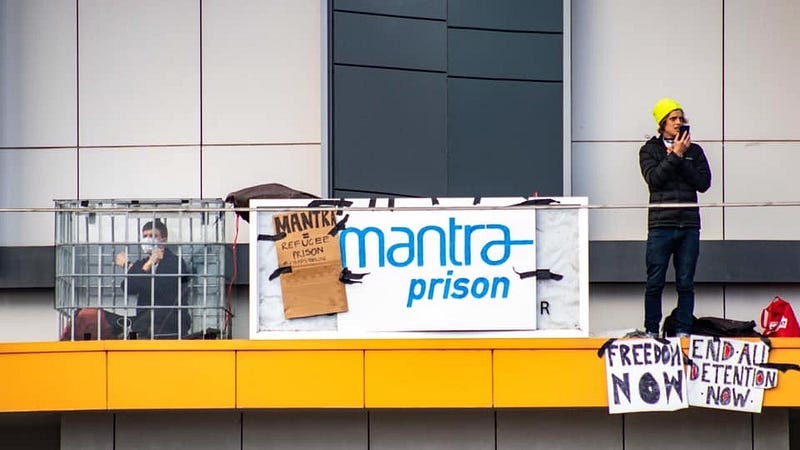Life in Indefinite Lockdown
How was it in there? Did you go crazy? It must have sucked!’ I asked my stepsons Canadian girlfriend.
How was it in there? Did you go crazy? It must have sucked!’ I asked my stepsons Canadian girlfriend.
A month or so ago she had a two week mandatory stay at a local hotel. It wasn’t planned that way — after a year working as an au pair in Australia, at the last minute she agreed to take a seat on a covid repatriation flight to Canada.
We said our teary farewells, and she was gone, my stepson bereft — with the borders closed indefinitely, it was not clear when they could see each other again.
But after the short internal flight to Melbourne, she just couldn’t make herself get on the flight back to Canada, and, in a twist worthy of a rom-com, she turned right around and took the next flight back to her boyfriend’s arms.
Well, not exactly into his arms — actually right into hotel quarantine, where she spent two weeks alone in a small room, with windows that only opened a few centimetres, unable to see or hug anyone, time filled talking to her partner on the phone, him parked in the car park below, just in the spot that would allow her to catch a glimpse of him from her window.
Of course, we all understood the need for quarantine but still, I wanted to know how she had coped with the experience.
Oh my goodness, it was so hard! she told me. I was so glad to get out of there!
I am not surprised, the thought of being unable to leave the room for two weeks is awful — even with access to clean hotel sheets and room service, wifi and a smartphone. There is something unnerving, and distressing about the idea of being unable to leave, unable to make your own choices. Being trapped. Shut in. Just the words make my skin crawl.
So, with this at the front of my mind, when I saw a photo of a man hanging out the window of a Mantra hotel in Brisbane a few days ago, the words written on his placard jumped out at me. 7 years in lockdown.
If two weeks in a hotel quarantine sounds so awful how would seven years without an end date feel? Without being able to take a walk along the beach? Without being able to visit the shops or hold a loved one? How could anyone cope with the feeling of being trapped, for so long, never knowing when it would end? It hit me in a new way.
Even in our prisons, people are given a timeline — an amount of time with an end date, set by experts in law and in line with the severity of the crime. An indefinite sentence would be seen to be too cruel even for the most heinous of criminal offences — it’s just not how our system works.
But the men in the Mantra hotels haven’t been convicted of any crimes. They came to Australia because they were so unwell after 6 years on Manus island, they were moved to the Manta Hotel 1 year ago under medivac legislation.
7 years of lockdown and counting. My imagination fails me when I try to picture it.
I think of the last seven years of my life — and all the things I have done, the places I have gone, the life I have lived. Children, holidays, time spent with friends and in nature, schooling, working, making a home.
I think of how long the last two months have felt, how happy I was to hug my friends, how long it felt since our last dinner together.
And then, I imagine seven years, shut away, with no choices, no freedom, never knowing when the nightmare would end.
I am not surprised when I hear detained refugee, artist and activist Farhad Bangash tell SBS’s Craig Foster of another attempted suicide last week — ironically, during Refugee Week, 2020. I was surprised though to read that his art supplies had been confiscated. Why? It just seems too cruel.
After all this time, how long is too long? Whatever number you come up with, surely we have reached that limit.
Indefinite detention is not a life, hell, it’s not even a punishment in a society like ours, so why are so many good hearted Australians willing to accept this as the status quo?
So many of us know it’s cruel but we’ve been trying for years without results and the passionate activists in our community are getting tired. I understand. I am also guilty of moving on, letting these men fall from the forefront of my mind.
But as we focus ourselves on the lives of the marginalised and of the oppressed, surely these lives belong at the forefront of our attention.
Because when all lives actually matter, we won’t need to state the obvious — that refugee lives matter and that we can’t stop our action until this cruel policy is over and these men are free.




